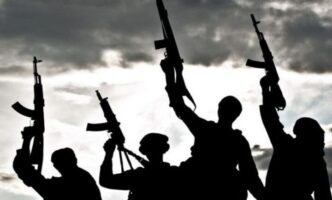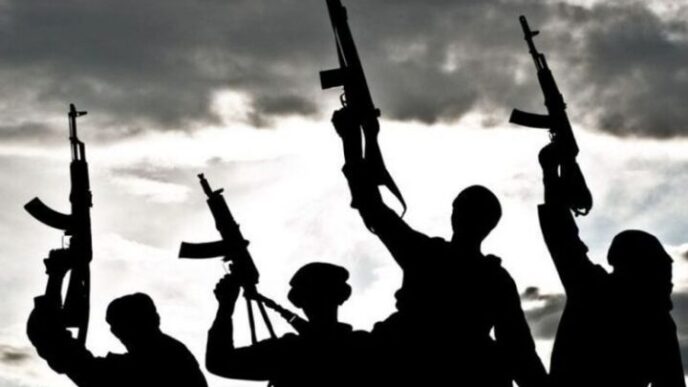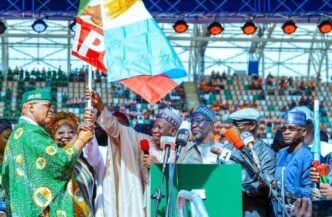File photo: An illustration of gunmen
Let us not mince words. Nigeria is not merely facing a security crisis; it is in the advanced stages of a fundamental crisis of state legitimacy. What we are witnessing is the direct result of a state that has, for decades, been hollowed out by a political class that often appears to view governance as a secondary concern to personal enrichment and the game of politicking. The chaos is not an accident; it has become a business, and for a powerful few, a dangerously profitable one.
The scale of the threat is staggering. The country is fighting a war on multiple fronts: a persistent ISWAP/Boko Haram insurgency in the north-east; a financially immense kidnapping-for-ransom crisis across the north-west; devastating massacres in the middle belt; and a rise in criminal violence in the south. This is not a simple security challenge. It is a systemic failure where the very institutions meant to protect citizens are either complicit or catastrophically ineffective. From the abduction of federal directors on major highways to the payment of ₦2.57 billion in ransoms in a single year, the Nigerian state is not just failing to protect its people; in many ways, it has become a source of their insecurity.
The government’s reaction to this multi-headed hydra has been a masterclass in misdirection, prioritising kinetic force over meaningful governance. This approach is not just failing; it is actively making the situation worse.
Successive administrations have ceded internal security to the military, a force stretched thin by operations across the country’s states. This is a poor substitute for the hard, politically costly work of reforming the notoriously predatory police force. Military campaigns with grand names like Operation Hadin Kai are launched, but they consistently fail to achieve lasting peace because they are fighting the symptoms, not the disease. They are undermined by the very institutional rot they are meant to overcome.
Advertisement
The single greatest obstacle to peace is the profound lack of political will to tackle the corruption that funds this crisis. While soldiers on the front lines complain of a lack of resources, billions of naira are lost yearly to procurement fraud and unaccountable “security votes”. This isn’t just inefficiency; it is a profitable enterprise. Insecurity has become an industry. We see this in the large-scale illegal mining that funds armed groups and in the ransom economy that has become a national shame. The system is designed to perpetuate itself.
The Nigerian elite has consistently ignored the fertile ground in which this violence grows: spiralling multi-dimensional poverty, youth unemployment, and extreme inequality. A report from Amnesty International notes that in the last two years alone, over 10,000 people have been killed by armed groups, displacing hundreds of thousands of farmers and creating a looming humanitarian crisis. When you have a population of young people with no hope, no job, and no future, you have a perfect recruitment pool for bandits and militants. By focusing only on the “bandits” and not the governance deficits that create them, the state ensures the perpetual regeneration of violence.
Let’s be clear about where this path leads. Nigeria’s security malaise aligns disturbingly with the structural failures of countries like the Democratic Republic of Congo (DRC) and Sudan. The common denominator is a state that has lost its monopoly on the legitimate use of force. In all three, you find predatory governance, where elites prioritise self-enrichment over public welfare.
Advertisement
While the DRC’s conflict is tied to conflict minerals and Sudan’s to a militarisation of politics, Nigeria’s version is the rapid criminalisation of political power. Our economy of violence is manifested in kidnapping, ransom payments and illegal mining, all underpinned by the same common denominators of state fragility, corruption, and elite factionalism. To think we are somehow immune to the collapses seen elsewhere is a dangerous delusion.
Perhaps the most telling sign of a state fearful of its own failures is its crackdown on those who speak truth to power. The institutions tasked with upholding the law have become the greatest threat to press freedom. A 2024 report by Media Right Agenda found that security and law enforcement agencies were responsible for 65% of attacks on journalists in the year. They harass, detain, and intimidate reporters under the guise of “national security”.
We saw this in 2019 with the threat to arrest investigative journalist, Fisayo Soyombo, after he exposed monumental corruption within the police and prison services by going undercover. The response to his heroic work wasn’t to clean up the system, but to attempt to punish the messenger. This creates a culture of impunity, where the government’s primary goal seems to be managing the narrative rather than solving the problem. When you silence the media, you are not protecting national security; you are protecting the corrupt system that is destroying the country.
So, where does this leave us?
Advertisement
The trajectory is perilous. The destination is not necessarily a dramatic, overnight collapse, but a slow, agonising descent into permanent chaos — a “failed state” in all but name. The continued haemorrhaging of human capital, mass displacement, and rising food insecurity threaten the viability of the entire nation. The U.S. Embassy itself rates Nigeria as “CRITICAL for crime,” warning its citizens of the pervasive threat of armed robbery and violence.
The warning is this: if Nigeria’s political elite continues to prioritise political manoeuvring — like the absurdly early campaigning for the 2027 elections — over the dismantling of the profitable infrastructure of corruption, the nation will be consumed entirely by the dark economy of crime and predation it currently indulges. The destination, which we currently share with the DRC and Sudan in their foundational failures, is a sustained internal war that will shatter the Nigerian project beyond repair. The storm is not just gathering; it is already upon us, and our pilots are busy rearranging the deckchairs.
Nwanze is a partner at SBM Intelligence
Views expressed by contributors are strictly personal and not of TheCable.






